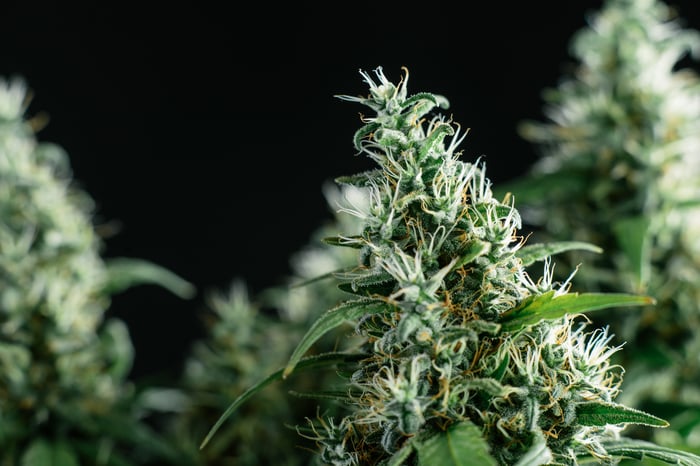One of the craziest years on record for the stock market will end in 3 weeks. The broad-based S&P 500 lost more than 30% in a month in 2020. It may end with the S&P 500 higher by over 15%.
Although volatility can be unnerving for some investors, it's lured millennial and novice investors.

Image source: Getty Images.
Online investing app Robinhood, which is best known for its commission-free trades, fractional share investing, and gifting of free stock shares to new members, has added millions of new users in 2020. Yet, the average age of its user base is only 31.
I love to see young people put their money to work in the greatest wealth creator on the planet. Yet without the proper tools or knowledge, these novice investors are often left to chase terrible companies or whatever stocks happen to be the story of the week. Robinhood's leaderboard (i.e., the 100 most-held stocks on the platform) is a smorgasbord of penny stocks and companies that long-term investors shouldn't touch.
Avoid the following three popular stocks like the plague in December.

Image source: Getty Images.
Moderna
There are a couple of potentially dangerous trends that Robinhood investors are obsessed with, including coronavirus disease 2019 (COVID-19) vaccine developers. Betting big on developers like Moderna (MRNA 0.66%) might backfire.
The key to Moderna's success lies with mRNA-1273, the company's COVID-19 vaccine candidate that's being examined in over 30,000 people in a late-stage U.S. trial. In an interim analysis in November, Moderna announced a 94.5% vaccine efficacy, which was far higher than researchers expected. As of this writing (Dec. 6), it's likely that mRNA-1273 will gain approval from the U.S. Food and Drug Administration (FDA) and become a key tool to halt the pandemic.
This is great news for humanity. But forking over your hard-earned cash to buy a clinical-stage drug developer now worth over $60 billion is insane.
It's unlikely to be the only show in town. The Pfizer/BioNTech vaccine candidate (BNT162b2) produced similar efficacy (95%) and is expected to gain approval from the FDA. With close to two dozen vaccines in development, Moderna seems to have little chance of gobbling up and maintaining significant market share.
What's more, biotech stocks are traditionally valued at a multiple of 3 to 6 times their peak annual sales. Moderna's blockbuster vaccine candidate is expected to settle around $4 billion in sales annually, according to Wall Street's estimates. This would place Moderna at closer to 15 times its annual revenue. Even factoring in a huge first-year sales bump that potentially carries mRNA-1273 to $6 billion in sales, Moderna is still valued at 10 times peak annual sales. That's far too rich for a biotech stock and all the more reason to avoid Moderna in December.

Image source: Getty Images.
HEXO
Another popular Robinhood stock that investors would be wise to avoid is small-cap Canadian marijuana stock HEXO (HEXO).
Like Moderna, HEXO is smack-dab in the middle of a rapidly growing industry. Marijuana could rival cloud computing as one of the fastest-growing trends this decade. Millennials tend to view cannabis favorably, and have piled into Canadian pot stocks. It's also worth noting that Robinhood doesn't allow its users to buy or sell stocks on the over-the-counter exchange, even though that's where most financially sound U.S. pot stocks can be found.
Arguably HEXO's biggest issue is its ongoing capital-raising plans. To ensure that HEXO has enough cash on hand to keep the lights on, it's been selling its common stock via offerings and using at-the-market sales to raise capital. Between July 31, 2019, and July 31, 2020, the company's outstanding share count nearly doubled to 482.5 million from 257 million. This ongoing dilution will wreck any chance investors have of seeing their shares appreciate over the long run.
HEXO's income statement also leaves a lot to be desired. Last year, the company lost more than $546 million Canadian, much of which was tied to one-time impairment charges and writedowns from an untimely and overpriced acquisition. Yet even without these one-time expenses, HEXO produced a negative gross margin and over CA$100 million in operating expenses in fiscal 2020. It's a long way from being profitable.
The icing on the cake is that HEXO is expected to enact a 1-for-8 reverse split in the coming days. Though this'll stave off delisting from the New York Stock Exchange, reverse splits are often viewed as an act of weakness by Wall Street.

The now-retired Nikola Badger EV. Image source: Nikola.
Nikola
Last is one of the most popular train wrecks of all: electric vehicle (EV) and hydrogen fuel cell vehicle manufacturer Nikola (NKLA -14.27%).
Six months ago, few stocks were hotter than Nikola. With EVs representing the clear path forward for the transportation industry, Nikola's Badger concept pickup truck and its commercial semi-truck prototypes generated a ton of buzz. Nikola also turned heads by striking an apparent equity deal with General Motors (GM 0.58%) in early September. The deal was to see General Motors take a $2 billion stake while handling the production of the EV and hydrogen fuel cell Badger.
But over the past four months, everything has unraveled. General Motors is no longer taking an equity stake in Nikola, and it won't be building the Badger. In response, Nikola has scraped the pet project of its founder Trevor Milton and agreed to refund those who made a deposit. Though GM and Nikola work on integrating GM's Hydrotec fuel cell technology into Nikola's commercial semitruck line, this revised deal left a lot to be desired.
Founder Trevor Milton has also been a huge liability for the company. In September, sell-side firm Hindenburg Research released a report alleging fraud and wrongdoing by Milton and Nikola. The Securities and Exchange Commission launched a probe into these allegations. Not long after, Milton announced via tweet that he'd step down as executive chairman of the Nikola board.
As you might expect of an entirely development-stage company, Nikola is losing money hand over fist. Nikola's year-to-date losses through the third quarter have nearly quadrupled from the prior-year period to $237.3 million. It's unclear if the company has enough capital to survive, making it an easy stock for long-term investors to avoid like the plague in December.





